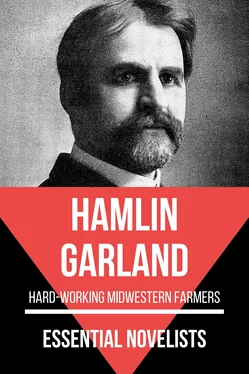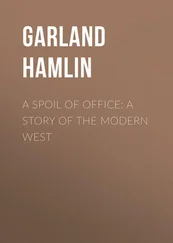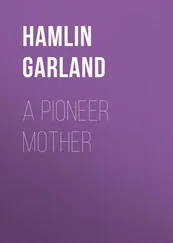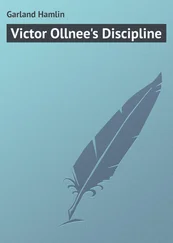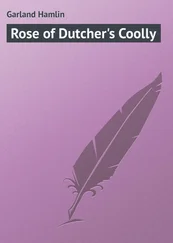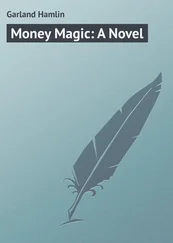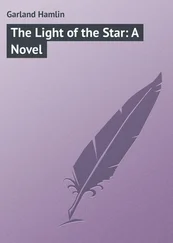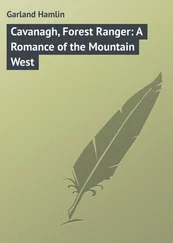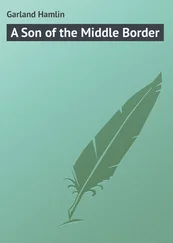We lodged that night in Hokah, a little town in a deep valley. The tavern stood near a river which flowed over its dam with resounding roar and to its sound I slept. Next day at noon we reached Caledonia, a town high on the snowy prairie. Caledonia! For years that word was a poem in my ear, part of a marvellous and epic march. Actually it consisted of a few frame houses and a grocery store. But no matter. Its name shall ring like a peal of bells in this book.
It grew colder as we rose, and that night, the night of the second day, we reached Hesper and entered a long stretch of woods, and at last turned in towards a friendly light shining from a low house beneath a splendid oak.
As we drew near my father raised a signal shout, "Hallo-o-o the House!" and a man in a long gray coat came out. "Is that thee, friend Richard?" he called, and my father replied, "Yea, neighbor Barley, here we are!"
I do not know how this stranger whose manner of speech was so peculiar, came to be there, but he was and in answer to my question, father replied, "Barley is a Quaker," an answer which explained nothing at that time. Being too sleepy to pursue the matter, or to remark upon anything connected with the exterior, I dumbly followed Harriet into the kitchen which was still in possession of good Mrs. Barley.
Having filled our stomachs with warm food mother put us to bed, and when we awoke late the next day the Barleys were gone, our own stove was in its place, and our faithful clock was ticking calmly on the shelf. So far as we knew, mother was again at home and entirely content.
This farm, which was situated two miles west of the village of Hesper, immediately won our love. It was a glorious place for boys. Broad-armed white oaks stood about the yard, and to the east and north a deep forest invited to exploration. The house was of logs and for that reason was much more attractive to us than to our mother. It was, I suspect, both dark and cold. I know the roof was poor, for one morning I awoke to find a miniature peak of snow on the floor at my bedside. It was only a rude little frontier cabin, but it was perfectly satisfactory to me.
Harriet and I learned much in the way of woodcraft during the months which followed. Night by night the rabbits, in countless numbers printed their tell-tale records in the snow, and quail and partridges nested beneath the down-drooping branches of the red oaks. Squirrels ran from tree to tree and we were soon able to distinguish and name most of the tracks made by the birds and small animals, and we took a never-failing delight in this study of the wild. In most of my excursions my sister was my companion. My brother was too small.
All my memories of this farm are of the fiber of poetry. The silence of the snowy aisles of the forest, the whirring flight of partridges, the impudent bark of squirrels, the quavering voices of owls and coons, the music of the winds in the high trees,—all these impressions unite in my mind like parts of a woodland symphony. I soon learned to distinguish the raccoon's mournful call from the quavering cry of the owl, and I joined the hired man in hunting rabbits from under the piles of brush in the clearing. Once or twice some ferocious, larger animal, possibly a panther, hungrily yowled in the impenetrable thickets to the north, but this only lent a still more enthralling interest to the forest.
To the east, an hour's walk through the timber, stood the village, built and named by the "Friends" who had a meeting house not far away, and though I saw much of them, I never attended their services.
Our closest neighbor was a gruff loud-voiced old Norwegian and from his children (our playmates) we learned many curious facts. All Norwegians, it appeared, ate from wooden plates or wooden bowls. Their food was soup which they called "bean swaagen" and they were all yellow haired and blue-eyed.
Harriet and I and one Lars Peterson gave a great deal of time to an attempt to train a yoke of yearling calves to draw our handsled. I call it an attempt, for we hardly got beyond a struggle to overcome the stubborn resentment of the stupid beasts, who very naturally objected to being forced into service before their time. Harriet was ten, I was not quite nine, and Lars was only twelve, hence we spent long hours in yoking and unyoking our unruly span. I believe we did actually haul several loads of firewood to the kitchen door, but at last Buck and Brin "turned the yoke" and broke it, and that ended our teaming.
The man from whom we acquired our farm had in some way domesticated a flock of wild geese, and though they must have been a part of the farm-yard during the winter, they made no deep impression on my mind till in the spring when as the migratory instinct stirred in their blood they all rose on the surface of the water in a little pool near the barn and with beating wings lifted their voices in brazen clamor calling to their fellows driving by high overhead. At times their cries halted the flocks in their arrowy flight and brought them down to mix indistinguishably with the captive birds.
The wings of these had been clipped but as the weeks went on their pinions grew again and one morning when I went out to see what had happened to them, I found the pool empty and silent. We all missed their fine voices and yet we could not blame them for a reassertion of their freeborn nature. They had gone back to their summer camping grounds on the lakes of the far north.
Early in April my father hired a couple of raw Norwegians to assist in clearing the land, and although neither of these immigrants could speak a word of English, I was greatly interested in them. They slept in the granary but this did not prevent them from communicating to our house-maid a virulent case of smallpox. Several days passed before my mother realized what ailed the girl. The discovery must have horrified her, for she had been through an epidemic of this dread disease in Wisconsin, and knew its danger.
It was a fearsome plague in those days, much more fatal than now, and my mother with three unvaccinated children, a helpless handmaid to be nursed, was in despair when father developed the disease and took to his bed. Surely it must have seemed to her as though the Lord had visited upon her more punishment than belonged to her, for to add the final touch, in the midst of all her other afflictions she was expecting the birth of another child.
I do not know what we would have done had not a noble woman of the neighborhood volunteered to come in and help us. She was not a friend, hardly an acquaintance, and yet she served us like an angel of mercy. Whether she still lives or not I cannot say, but I wish to acknowledge here the splendid heroism which brought Mary Briggs, a stranger, into our stricken home at a time when all our other neighbors beat their horses into a mad gallop whenever forced to pass our gate.
Young as I was I realized something of the burden which had fallen upon my mother, and when one night I was awakened from deep sleep by hearing her calling out in pain, begging piteously for help, I shuddered in my bed, realizing with childish, intuitive knowledge that she was passing through a cruel convulsion which could not be softened or put aside. I went to sleep again at last, and when I woke, I had a little sister.
Harriet and I having been vaccinated, escaped with what was called the "verylide" but father was ill for several weeks. Fortunately he was spared, as we all were, the "pitting" which usually follows this dreaded disease, and in a week or two we children had forgotten all about it. Spring was upon us and the world was waiting to be explored.
One of the noblest features of this farm was a large spring which boiled forth from the limestone rock about eighty rods north of the house, and this was a wonder-spot to us. There was something magical in this never-failing fountain, and we loved to play beside its waters. One of our delightful tasks was riding the horses to water at this spring, and I took many lessons in horsemanship on these trips.
Читать дальше
